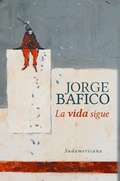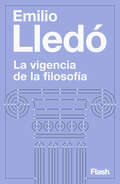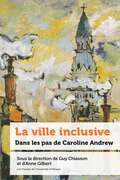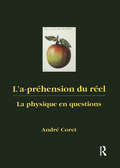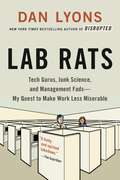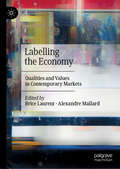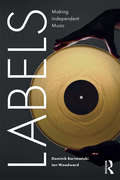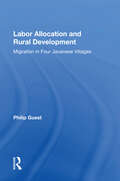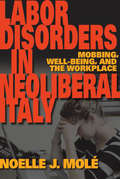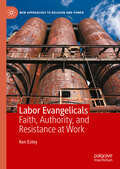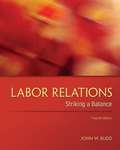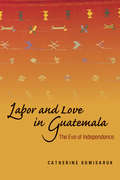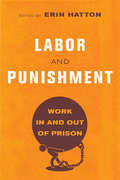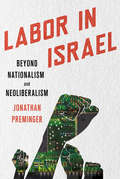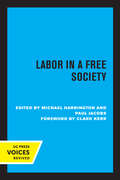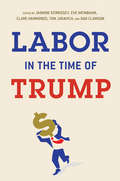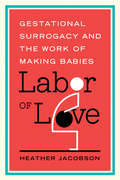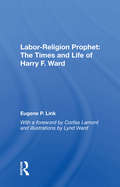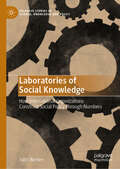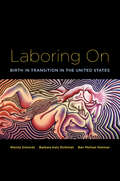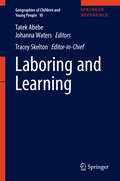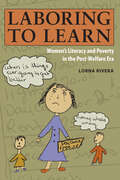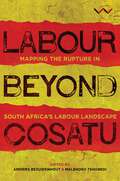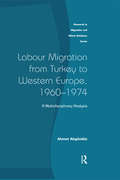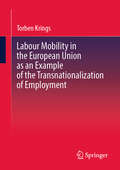- Table View
- List View
La vida sigue
by Jorge BaficoEste libro es un recorrido y un homenaje. Una invitación a conocer las zonas más complejas de la psique humana, a través de diferentes historias de pacientes. También es un homenaje a la figura de Dagoberto Puppo, un gran médico que ha sido maestro, ejemplo y amigo del autor. El psicoanalista Jorge Bafico y el psiquiatra Dagoberto Puppo recorrieron un largo camino juntos. Un sólido vínculo afectivo y profesional los arropó mientras trabajaron con muchos pacientes. Tras el fallecimiento de Dagoberto en abril de 2009, Jorge supo que tenía que escribir este libro. Recorriendo sus páginas, el lector se encontrará con casos clínicos que tocan la locura, y que al mismo tiempo se convierten en cercanos. Bafico nos acerca a la patología en su versión más cotidiana, desde el respeto y una profunda sensibilidad. Un encuentro con la clínica desde dentro, moldeada a través del vínculo con Dagoberto. Este libro es también un homenaje a un gran médico que ha sido maestro, ejemplo y amigo del autor. Cómo él mismo dice: #Hay hombres que son excepcionales. Dagoberto lo fue y yo tuve la suerte de conocerlo#. Con un lenguaje directo y luminoso, Jorge Bafico nos invita a conocer esta historia de aprendizajes, gratitud y esperanza, pero también de angustia y dolor. Fiel a su estilo, cada texto está acompañado por citas musicales que complementan y amplifican el sentido de cada capítulo.
La vigencia de la filosofía
by Emilio LledóUna defensa acérrima de la utilidad de la filosofía en nuestros días de la mano del gran pensador Emilio Lledó. «[...] la filosofía se nos aparece como una ocupación de algunos hombres, tan real e importante como esas otras ocupaciones que han modificado, técnica o artísticamente, la faz del mundo y las relaciones humanas.» ¿Está la filosofía en crisis o sigue siendo una ocupación necesaria para entender y analizar el mundo? ¿Puede considerarse la filosofía un oficio? ¿Cómo debe dialogar la filosofía con la historia precedente o con la ciencia y la tecnología de nuestro siglo? Bajo estos interrogantes, el gran pensador Emilio Lledó atiende la urgencia de recuperar la filosofía como una materia indispensable para ejercer un pensamiento crítico y teje un texto que ensalza las virtudes inexcusables y atemporales del saber filosófico en la modernidad y la era del consumismo. Galardonado con el Premio Nacional de las Letras Españolas 2014 y el Premio Princesa de Asturias 2015, Emilio Lledó ha colocado la filosofía en el centro de todas sus obras y la ha defendido como base de toda educación. El texto aquí presentado pertenece a su obra Sobre la educación (Taurus, 2018). Sobre el autor:«Si hubiera muchos intelectuales como Lledó el nuestro sería un país bien distinto.»Elvira Lindo «Pocos intelectuales se ciñen con tanta justeza al concepto de sabio. Desde la atalaya de sus 94 años, Lledó sigue mirando al futuro».Guillermo Altares, El País «Un diccionario de alertas con el destello de los grandes filósofos detrás para advertir de la gran herencia de la cultura como herramienta de civilización, de progreso, de justicia y de verdad.»Antonio Lucas, El Mundo «Un gran ensayista y divulgador de alto nivel, entre los temas que trata destacan la defensa de la lectura, la felicidad, el silencio, la bellezay la verdad.»Winston Manrique, El País
La ville inclusive: Dans les pas de Caroline Andrew (Politique et politiques publiques)
by Geneviève TellierLa ville inclusive : dans les pas de Caroline Andrew is a festschrift in honour of this researcher's exceptional contributions, which follow a common thread—the inclusive city. Her interests extended from population studies to politics, with an emphasis on municipal governance, particularly through her interest in the influence of various “equity-seeking groups,” an expression she coined. In this volume, specialists in urban studies offer their own opinions on contemporary urbanity in the wake of her trailblazing research. It includes thorough analyses of inclusion policy issues Canadian cities face daily, unpublished case studies, and useful observations and proposals for decision making at the city level. La ville inclusive is one of those rare French-language books that tackles the issue of inclusion. It acts as a multidisciplinary meeting place in which to discuss the over-riding challenge of togetherness in a world that is increasingly urbanized and fragmented.
La-préhension du réel
by Andre CoretLe réel est (réellement) non représentable: telle est la découverte majeure que les scientifiques et les physiciens en particulier, ont faite pour leur compte au cours du XXe siècle. Mais, le savent-ils? The real is (really) unrepresentable: this is the major discovery that scientists and physicists in particular have made on their own during the twentieth century.
Lab Rats: How Silicon Valley Made Work Miserable for the Rest of Us
by Dan LyonsNew York Times bestselling author Dan Lyons exposes how the "new oligarchs" of Silicon Valley have turned technology into a tool for oppressing workers in this "passionate" (Kirkus) and "darkly funny" (Publishers Weekly) examination of workplace culture.At a time of soaring corporate profits and plenty of HR lip service about "wellness," millions of workers--in virtually every industry--are deeply unhappy. Why did work become so miserable? Who is responsible? And does any company have a model for doing it right?For two years, Lyons ventured in search of answers. From the innovation-crazed headquarters of the Ford Motor Company in Detroit, to a cult-like "Holocracy" workshop in San Francisco, and to corporate trainers who specialize in ... Legos, Lyons immersed himself in the often half-baked and frequently lucrative world of what passes for management science today. He shows how new tools, workplace practices, and business models championed by tech's empathy-impaired power brokers have shattered the social contract that once existed between companies and their employees. These dystopian beliefs--often masked by pithy slogans like "We're a Team, Not a Family"--have dire consequences: millions of workers who are subject to constant change, dehumanizing technologies--even health risks. A few companies, however, get it right. With Lab Rats, Lyons makes a passionate plea for business leaders to understand this dangerous transformation, showing how profit and happy employees can indeed coexist.
Labelling the Economy: Qualities and Values in Contemporary Markets
by Brice Laurent Alexandre MallardThis collected volume analyses labelling as a political and economic operation. It gathers contributions that focus on various domains, including the agri-food sector, the construction sector, eco-labelling, retail, health public policies and the energy sector, considering the use of labels for various objectives, such as providing legal and technical data on consumption products, certifying their quality, and indicating the approval of professional or political authorities. These practices are tied to both public and private interventions that make civic concerns visible and aim to govern them. The book considers ‘labelling the economy’ as an operation that introduces political questions into the economic realm, while also importing economic modes of reasoning into governance interventions. In doing so, the book considers the sociotechnical apparatus on which any label relies as a nexus where economic and political considerations are brought together.
Labels: Making Independent Music (Criminal Practice Ser.)
by Ian Woodward Dominik BartmanskiThe music industry is dominated today by three companies. Outside of it, thousands of small independent record labels have developed despite the fact that digitalization made record sales barely profitable. How can those outsiders not only survive, but thrive within mass music markets? What makes them meaningful, and to whom? Dominik Bartmanski and Ian Woodward show how labels act as taste-makers and scene-markers that not only curate music, but project cultural values which challenge the mainstream capitalist music industry. Focusing mostly on labels that entered independent electronic music after 2000, the authors reconstruct their aesthetics and ethics. The book draws on multiple interviews with labels such as Ostgut Ton in Berlin, Argot in Chicago, 100% Silk in Los Angeles, Ninja Tune in London, and Goma Gringa in Sao Paulo. Written by the authors of Vinyl, this book is essential reading for anyone with an interest in the contemporary recording industry, independent music, material culture, anthropology, sociology, and cultural studies.
Labor Allocation And Rural Development: Migration In Four Javanese Villages
by Philip GuestBy integrating migration research in a comprehensive framework of labour allocation at household and village levels, this study shows how migration factors are crucial in understanding the transformations of rural communities in developing countries. Data collected in 4 villages within a wet rice-growing area of Central Java, Indonesia, are used to examine why some villages and households contribute a greater share of migrants than others. The decision to migrate is located within the constraints and opportunities of local labour markets, and migration is treated as one among many alternatives for allocating the labour of household members. The type of labour allocation choices made is lined to the demographic structure of households, the social position of the household, and the employment opportunities available within the community. These factors are then related to processes of rural development.
Labor Disorders in Neoliberal Italy
by Noelle J. MoléPsychological harassment at work, or "mobbing," has become a significant public policy issue in Italy and elsewhere in Europe. Mobbing has given rise to specialized counseling clinics, a new field of professional expertise, and new labor laws. For Noelle J. Molé, mobbing is a manifestation of Italy's rapid transition from a highly protectionist to a market-oriented labor regime and a neoliberal state. She analyzes the classification of mobbing as a work-related illness, the deployment of preventive public health programs, the relation of mobbing to gendered work practices, and workers' use of the concept of mobbing to make legal and medical claims, with implications for state policy, labor contracts, and political movements. For many Italian workers, mobbing embodies the social and psychological effects of an economy and a state in transition.
Labor Evangelicals: Faith, Authority, and Resistance at Work (New Approaches to Religion and Power)
by Ken EsteyLabor Evangelicals studies theologically conservative working class evangelicals in the United States who resist the common preconception that they eagerly embrace deregulation, unfettered markets, and globalized capital. Methodologically, this book studies evangelical workers at the grassroots level to discern the complexity of their perspectives about work, unions, class, and power. This book shows how white and African American evangelicals think about labor in working-class communities in Bethlehem, Pennsylvania and Moncure, North Carolina.
Labor Relations: Striking a Balance (Fourth Edition)
by John W. Budd<p>John Budd continues to present the most dynamic, engaging approach to understanding labor relations in the 21st century with Labor Relations, 4/e. This textbook presents labor relations as a system for balancing employment relationship goals (efficiency, equity, and voice) and the rights of labor and management. <p>By weaving these themes with the importance of alternative perspectives on the nature of the employment relationship throughout the text, students can learn not only how the traditional labor relations processes work, but also why these processes exist and how to evaluate whether they are working. In this way, students can develop a deeper understanding of labor relations that will help them successfully navigate a contemporary labor relations system that faces severe pressures requiring new strategies, policies, and practices.</p>
Labor and Love in Guatemala: The Eve of Independence
by Catherine KomisarukLabor and Love in Guatemalare-envisions the histories of labor and ethnic formation in Spanish America. Taking cues from gender studies and the "new" cultural history, the book transforms perspectives on the major social trends that emerged across Spain's American colonies: populations from three continents mingled; native people and Africans became increasingly hispanized; slavery and other forms of labor coercion receded. Komisaruk's analysis shows how these developments were rooted in gendered structures of work, migration, family, and reproduction. The engrossing narrative reconstructs Afro-Guatemalan family histories through slavery and freedom, and tells stories of native working women and men based on their own words. The book takes us into the heart of sweeping historical processes as it depicts the migrations that linked countryside to city, the sweat and filth of domestic labor, the rise of female-headed households, and love as it was actually practiced—amidst remarkable permissiveness by both individuals and the state.
Labor and Punishment: Work in and out of Prison
by Erin HattonThe insightful chapters in this volume reveal the multiple and multifaceted intersections between mass incarceration and neoliberal precarity. Both mass incarceration and the criminal justice system are profoundly implicated in the production and reproduction of the low-wage "exploitable" precariat, both within and beyond prison walls. The carceral state is a regime of labor discipline—and a growing one—that extends far beyond its own inmate labor. This regime not only molds inmates into compliant workers willing and expected to accept any "bad" job upon release but also compels many Americans to work in such jobs under threat of incarceration, all the while bolstering their "exploitability" and socioeconomic marginality. Contributors include Anne Bonds, Philip Goodman, Amanda Bell Hughett, Caroline M. Parker, Gretchen Purser, Jacqueline Stevens, and Noah D. Zatz.
Labor in Israel: Beyond Nationalism and Neoliberalism
by Jonathan PremingerUsing a comprehensive analysis of the wave of organizing that swept the country starting in 2007, Labor in Israel investigates the changing political status of organized labor in the context of changes to Israel’s political economy, including liberalization, the rise of non-union labor organizations, the influx of migrant labor, and Israel’s complex relations with the Palestinians. Through his discussion of organized labor’s relationship to the political community and its nationalist political role, Preminger demonstrates that organized labor has lost the powerful status it enjoyed for much of Israel’s history. Despite the weakening of trade unions and the Histadrut, however, he shows the ways in which the fragmentation of labor representation has created opportunities for those previously excluded from the labor movement regime.Organized labor is now trying to renegotiate its place in contemporary Israel, a society that no longer accepts labor’s longstanding claim to be the representative of the people. As such, Preminger concludes that organized labor in Israel is in a transitional and unsettled phase in which new marginal initiatives, new organizations, and new alliances that have blurred the boundaries of the sphere of labor have not yet consolidated into clear structures of representation or accepted patterns of political interaction.
Labor in a Free Society
by Michael Harrington Paul JacobsThis title is part of UC Press's Voices Revived program, which commemorates University of California Press’s mission to seek out and cultivate the brightest minds and give them voice, reach, and impact. Drawing on a backlist dating to 1893, Voices Revived makes high-quality, peer-reviewed scholarship accessible once again using print-on-demand technology. This title was originally published in 1959.
Labor in the Time of Trump
by Et Al. Jasmine KerrisseyLabor in the Time of Trump critically analyzes the right-wing attack on workers and unions and offers strategies to build a working–class movement.While President Trump's election in 2016 may have been a wakeup call for labor and the Left, the underlying processes behind this shift to the right have been building for at least forty years. The contributors show that only by analyzing the vulnerabilities in the right-wing strategy can the labor movement develop an effective response.Essays in the volume examine the conservative upsurge, explore key challenges the labor movement faces today, and draw lessons from recent activist successes.Donald Cohen, founder and executive director of In the Public Interest; Bill Fletcher, Jr., author of Solidarity Divided; Shannon Gleeson, Cornell University School of Industrial and Labor Relations; Sarah Jaffe, co-host of Dissent Magazine's Belabored podcast; Cedric Johnson, University of Illinois at Chicago; Jennifer Klein, Yale University; Gordon Lafer, University of Oregon's Labor Education and Research Center; Jose La Luz, labor activist and public intellectual; Nancy MacLean, Duke University; MaryBe McMillan, President of the North Carolina state AFL-CIO; Jon Shelton, University of Wisconsin, Green Bay; Lara Skinner, The Worker Institute at Cornell University; Kyla Walters, Sonoma State University
Labor of Love: Gestational Surrogacy and the Work of Making Babies
by Heather JacobsonWhile the practice of surrogacy has existed for millennia, new fertility technologies have allowed women to act as gestational surrogates, carrying children that are not genetically their own. While some women volunteer to act as gestational surrogates for friends or family members, others get paid for performing this service. The first ethnographic study of gestational surrogacy in the United States, Labor of Love examines the conflicted attitudes that emerge when the ostensibly priceless act of bringing a child into the world becomes a paid occupation. Heather Jacobson interviews not only surrogate mothers, but also their family members, the intended parents who employ surrogates, and the various professionals who work to facilitate the process. Seeking to understand how gestational surrogates perceive their vocation, she discovers that many regard surrogacy as a calling, but are reluctant to describe it as a job. In the process, Jacobson dissects the complex set of social attitudes underlying this resistance toward conceiving of pregnancy as a form of employment. Through her extensive field research, Jacobson gives readers a firsthand look at the many challenges faced by gestational surrogates, who deal with complicated medical procedures, delicate work-family balances, and tricky social dynamics. Yet Labor of Love also demonstrates the extent to which advances in reproductive technology are affecting all Americans, changing how we think about maternity, family, and the labor involved in giving birth. For more, visit http://www.heatherjacobsononline.com/
Labor-religion Prophet: The Times And Life Of Harry F. Ward
by Eugene P LinkAs first national chairman of the American Civil Liberties Union, the first professor of Christian ethics at both Boston University and Union Theological Seminary, and a pioneer of dialogs between religion and Marxism, Harry F. Ward led a life marked with many milestones. An advocate of the working-class and the underprivileged, Ward avoided the do
Laboratories of Social Knowledge: How International Organizations Construct Social Policy Through Numbers (Palgrave Studies in Science, Knowledge and Policy)
by John BertenThe book examines the politics of knowledge in global social policy, investigating how international organisations (IOs) have contributed to the emergence and development of social security as a global policy field. It reconstructs the role of numerical knowledge in the International Labour Organization (ILO) and the World Bank, theorising how IOs contribute to epistemic infrastructures of global social security. The book shows how IOs&’ knowledge production has led to a continuous refinement of the meaning and purpose of social security. First, it reveals how IOs arrived at a shared conception of social security: what the book calls an ontological framework. Second, it traces how numbers have increasingly enabled the assessment of countries according to shared benchmarks: what the book calls an evaluative framework. The author demonstrates the political and epistemic work involved in universalising knowledge of social security, while highlighting the limits of governing by numbers in global social policy.
Laboring On: Birth in Transition in the United States (Perspectives on Gender)
by Barbara Katz Rothman Wendy Simonds Bari Meltzer NormanFacing the polar forces of an epidemic of Cesarean sections and epidurals and home-like labor rooms, American birth is in transition. Caught between the most extreme medicalization — best seen in a Cesarean section rate of nearly 30 percent — and a rhetoric of women’s "choices" and "the natural," women and their midwives, doulas, obstetricians, and nurses labor on. Laboring On offers the voices of all of these practitioners, all women trying to help women, as they struggle with this increasingly split vision of birth. Updating Barbara Katz Rothman's now-classic In Labor, the first feminist sociological analysis of birth in the United States, Laboring On gives a comprehensive picture of the ever-changing American birth practices and often conflicting visions of birth practitioners. The authors deftly weave compelling accounts of birth work, by midwives, doulas, obstetricians, and nurses, into the larger sociohistorical context of health care practices and activism and offer provocative arguments about the current state of affairs and the future of birth in America.
Laboring and Learning
by Johanna Waters Tatek AbebeThis volume incorporates ground-breaking new academic perspectives on the contributions that children and young people make to societies around the world, with a particular focus on learning and work. The chapters in the volume offer conceptual and empirical insights into how young people learn to labour, and the complex social, spatial, temporal, institutional and relational processes that informs their engagements in daily, generational and social reproduction. The editors have intentionally avoided using the terms 'education' and 'employment' in the title, as this volume is an attempt to capture the multitude of ways, spaces and contexts (not just 'formal') in which learning takes place and work is carried out. Here, learning indicates education in the broadest possible sense, to incorporate not just formal schooling and the acquisition of institutionally recognised academic knowledge and credentials, but also informal learning (including socialization and the on-the-job acquisition of skills that takes place almost imperceptibly, over time). In addition to the theoretical perspectives this volume brings on young people's education and work, other prominent conceptual themes present throughout the work are mobilities, transitions and gender. Following four initial chapters that engage with conceptual issues, the remainder of the volume is divided into two sections, entitled 'spaces of labouring and learning' and 'livelihoods, transitions and social reproduction'. Within these sections, a broad spectrum of empirical chapters demonstrates how young people live, learn and labour in Africa, Asia, Europe and Latin America. These include, among others, geographies of education; interface between migration, learning and livelihoods; cultural politics of human capital formation; schooling and work; citizenship education; families and parenting; socialization and informal education; education-induced migration; processes and practices of inclusion and exclusion in educational institutions; part-time work; domestic work; care work; informal livelihoods; entrepreneurship; social transitions; and a wide range of social, economic, cultural, political (structural) forces that intersect and dissect these topics. As the reader will become aware, there is no such thing as a standard educational or work trajectory, a 'normal' transition or a straight forward relationship between work, education and social reproduction. Indeed, one of the aims of the volume is deliberately to showcase the diversity that young people's lives hold in this regard.
Laboring to Learn: Women's Literacy and Poverty in the Post-Welfare Era
by Lorna RiveraThe American adult education system has become an alternative for school dropouts, with some state welfare policies requiring teen mothers and women without high school diplomas to participate in adult education programs to receive aid. Currently, low-income women of color are more likely to be enrolled in the lowest levels of adult basic education. Very little has been published about women's experiences in these mandatory programs and whether the programs reproduce the conditions that forced women to drop out in the first place. Lorna Rivera bridges the gap with this important study, the product of ten years' active ethnographic research with formerly homeless women who participated in adult literacy education classes before and after welfare reform. She draws on rich interviews with organizers and participants in the Adult Learners Program at Project Hope, a women's shelter and community development organization in Boston's Dudley neighborhood, one of the poorest in the city. Analyzing the web of ideological contradictions regarding "work first" welfare reform policies, Rivera argues that poverty is produced and reproduced when women with low literacy skills are pushed into welfare-to-work programs and denied education. She examines how various discourses about individual choice and self-sufficiency shape the purposes of literacy, how low-income women express a sense of personal responsibility for being poor, and how neoliberal ideologies and practices compromise the goals of critical literacy programs. Throughout this study, the voices and experiences of formerly homeless women challenge cultural stereotypes about poor women, showing in personal and structural terms how social and economic forces shape and restrict opportunities for low-income women of color.
Labour Beyond Cosatu: Mapping the rupture in South Africa’s labour landscape
by ANDRIES BEZUIDENHOUT & MALEHOKO TSHOAEDILabour Beyond Cosatu is the fourth volume in the series Taking Democracy Seriously – a ground-breaking, textured and nuanced study on workers and democracy – which was established in the 1990s. The series looks at members of trade unions affiliated to the Congress of South African Trade Unions (Cosatu) and provides a rich database of trade union members and research conducted over the past twenty years. It is one of the very few such resources available to researchers anywhere in the world. Labour Beyond Cosatu paints a complex picture. The 12 chapters of the volume explore various rebellions and conflicts in the trade union sector, starting with the National Union of Mineworkers (NUM) and rivalries between Cosatu affiliates. Unpacking the conflicts between state-sector and private-sector workers, contributors look at the impact of generational and educational shifts, seen by some commentators as proof that Cosatu is now ‘middle class’. The book also raises the issue of gender in the unions by usefully locating the controversy around charges levelled at Zwelinzima Vavi in 2013 in the larger context of serious problems in the gender politics within parts of Cosatu.Refuting the image of a union federation solidly committed to the ANC, Labour Beyond Cosatu presents evidence of a sharp decline in support for the ANC within Cosatu, and growing scepticism towards the Alliance. It shows that attempts to understand the labour movement in South Africa in the future will need to include research of smaller, independent unions and social movements. The volume’s contributors make a major contribution to key debates on labour and democracy, providing new material that can potentially shift the discussion in important ways. This book will be of great value to students and researchers in Industrial Sociology, Political Studies, Industrial Psychology and Economics and Management.
Labour Migration from Turkey to Western Europe, 1960-1974: A Multidisciplinary Analysis (Research in Migration and Ethnic Relations Series)
by Ahmet AkgunduzGroundbreaking in its comprehensiveness, this book illuminates the migration of workers from Turkey to Western Europe with new perspectives previously overlooked in research. Indeed, this is the first study of its kind to cover the entire migration process, making extensive use of primary as well as secondary sources in four languages, and it draws on both the historiography and the social sciences of migration. It presents new analyses of the so-called 'push' factors behind this movement and explores the role of the sending state, the system and channels through which labour exits, the labouring population's attitudes towards moving to the West and the relevance of social networks in the migration process. The volume offers a critical assessment of the significance of Turkish labour migration with regard to the demand for foreign labour in Europe, with particular emphasis on the cases of Germany and the Netherlands.
Labour Mobility in the European Union as an Example of the Transnationalization of Employment
by Torben KringsThis book examines the changing significance of intra-European labor mobility in the 21st century. The focus is on the driving forces, the labor market effects and the regulation of this mobility. It is shown that there is a demand for workers with different qualifications in the "post-industrial" societies of Western Europe. This demand is primarily met by migration from the enlarged EU. However, this is no longer traditional labor migration, but the mobility of EU citizens. This brings with it new opportunities, but also challenges in a transnational mobility space, which is also a space of inequality.
